
‘You are the only passenger’: How I returned to an empty world
Follow a photographer’s journey from a remote island in the South Atlantic to a world paused by pandemic.
When the world screeched to a halt, I didn’t notice. I was off the grid near Antarctica, lost in the cacophony of some 200,000 penguins. Elsewhere, highways were emptying, planes parking, and businesses shuttering as COVID-19 gained ground. But the order for social distancing hadn’t yet stretched to this corner of the planet.
At the start of my two-week stint as a guest speaker aboard the National Geographic Explorer en route to South Georgia Island, there were only a handful of coronavirus cases reported in Argentina or Chile. As the pandemic loomed, it seemed as if our isolated tour was a well-timed escape. Passengers were checked for fever before boarding in Ushuaia, Argentina, and we quickly set course for the Falkland Islands. I wanted to believe, optimistically, that the virus would spike during our journey and we’d return after the worst of it.


A fleeting escape
Upon reaching the Falklands, we marveled at colonies of black-browed albatross, the giant-winged fliers that can spend up to five years at sea and cover 10,000 miles a year. As we moved on southeasterly through moderate swells, we became aware that the coronavirus was beginning to spread in South America. A few days later, the peaks of South Georgia Island emerged on the horizon. We landed at Salisbury Plains, and I stepped ashore into a vast wilderness that seemed untouched by the modern world.
It wasn’t untouched, of course. Early explorers, sealers, and whalers landed here more than a century ago, bringing rats that have since been eradicated. Whale populations are slowly recovering from the unabated hunting that took place in the first half of the 20th century. As a result, much of this wildlife sanctuary appears—and perhaps even sounds—similar to what those early pioneers discovered. One Explorer crewmember, marking his fifth visit here, described it as “God’s last painting.”

If it’s a painting, it’s a loud one. I sat on a grassy knoll overlooking Salisbury Plain as it reverberated to the chaotic choir of king penguins. A massive colony stretched for what looked like a mile along the island’s northern coastline, past a bay and up a glacial valley. As far as I could see, black-and-white figures crowded together, lost in the chatter. Weighing nearly 40 pounds and standing up to three feet high, king penguins are second only to emperor penguins in size. Their song is even bigger: The colony’s symphony of coos and calls, blended with howling fur seal pups and trumpeting sea birds, created an orchestra of natural sound.
Survival is a constant struggle in this harsh ecosystem—and not only for animals. We hiked in the footsteps of turn-of-the-century explorer Sir Ernest Shackleton, who became famous for surviving against all odds when his ship, Endurance, cracked and sank in the ice of Antarctica’s Weddell Sea. The crew spent several months camped on the sea ice before rowing to refuge on the deserted Elephant Island. Finally, Shackleton and five crew members braved a grueling, two-week, open-ocean voyage in a single, ice-rimed, 20-foot boat to South Georgia island. Just over a week later, they had traversed the island’s glaciers to reach the whaling station at Stromness, finally able to send help for the crew left behind.
We tracked the last steps of Shackleton’s journey, as fur seals tussled near the rusting structures of the Stromness whaling station. On a rocky ridge, I marveled at the determination required to survive in such extreme isolation. Not only did Shackleton endure his epic odyssey, but so did his entire crew, including those stranded for four months on Elephant Island.
We returned to the ship to learn our own chilling news: The cold fingers of coronavirus had reached across the swells of the Southern Ocean. Borders and ports were rapidly closing, and there was a growing concern we might arrive too late to disembark anywhere. I considered the irony. Shackleton had battled isolation; now we—along with the rest of the world—were seeking it.
Homeward bound
Albatrosses glided off our stern as we headed back to the Falklands, uncertain of where and when we’d disembark. On St. Patrick’s Day, Chile and Argentina closed their ports. Although the U.K.-controlled Falklands debated the same, we safely arrived in Port Stanley.
From there it was a flurry of flights through the viral gauntlet from the Falkland Islands to São Paolo, Brazil, and then to Chicago to catch my last plane home. In nearly empty airports, I saw face masks and feverish hand-scrubbing. As I boarded my final flight, the gate agent asked my name and smiled. “You are the only passenger. Enjoy.”


The flight attendants, who were flying to Colorado whether I boarded or not, offered me an upgrade “anywhere you want,” plus endless snacks and a set of wings reserved for kids. We took selfies.
When I left home, the world was still buried in busyness, and I was excited for the solitude of South Georgia’s wilderness. I returned to a different world—one quieted by COVID-19. All the while, the music of the penguin colony echoed in my head.
Like everyone else, I self-quarantined and social-distanced, FaceTiming with family and friends. To my delight, they all picked up. We spoke to each other of fear and confusion. We were all, in our own way, exploring new territory and rediscovering a forgotten sound: quiet.



